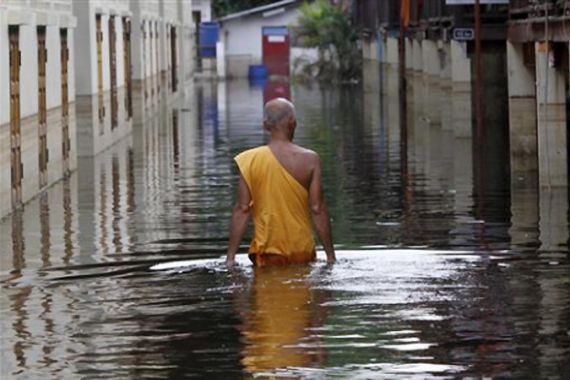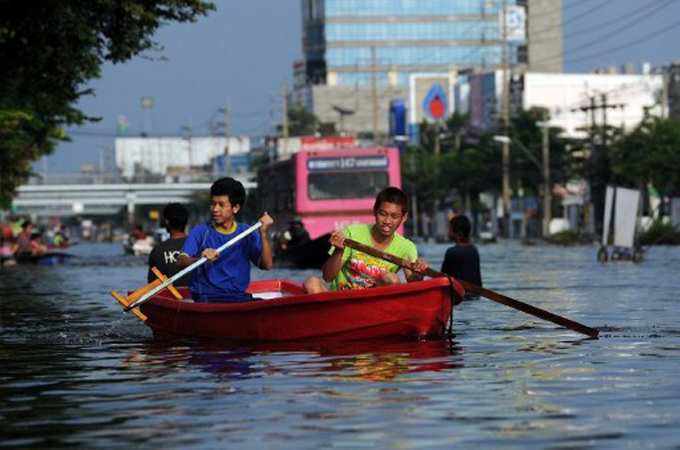Thailand unveils flood-prevention plan
PM announces $9.4bn series of water-management schemes to prevent repeat of last year’s devastating flood disaster.

 |
| With rainy season only four months away, business leaders fear Thai government is not preparing soon enough [AFP] |
The Thai government has drawn up a 300bn baht ($9.4bn) plan for water-management and flood-prevention schemes along the Chao Phraya river basin to prevent a repeat of devastating floods last year.
The plan, announced on Friday by Yingluck Shinawatra, the Thai prime minister, includes reforestation, dam construction, and city planning.
Keep reading
list of 4 itemsCould shipping containers be the answer to Ghana’s housing crisis?
Thousands protest against over-tourism in Spain’s Canary Islands
Holding Up the Sky: Saving the Indigenous Yanomami tribe in Brazil’s Amazon
The details of the plan have been criticised by business leaders who say the proposed five-month timeline should be accelerated, but experts warn against hasty reaction.
Of particular concern to those calling for an accelerated timetable, is the impending rainy season, only four months away.
Al Jazeera’s Wayne Hay, reporting from the Thai capital Bangkok, said there is “still too much water left over in resevoirs … authorities are being urged to release more water from reservoirs” before the start of the rainy season in May.
‘Cannot wait’
Kittirat Na Ranong, the deputy prime minister and incoming finance minister, said last weekend “we have to move quickly. This cannot wait”.
The rainy season this year is expected to be particularly heavy due to the La Nina effect.
|
“I’m not that confident these projects would work. The time period for formulating this plan is very, very short.“ – Chaiyuth Sukhsri, professor |
At an announcement last weekend, Ranong presented a series of seven water-management projects.
The projects included planting trees and building dams along upstream tributaries of the Chao Praya river, construction of reservoirs in the river basins where the floods developed, building of floodways in 800,000 acres of farmland plus irrigation systems, and the cleaning-up of canals and waterways and establishing a data system for water management.
“I’m not that confident these projects would work,” said Chaiyuth Sukhsri, head of the Water Resources Engineering Department at Bangkok’s Chulalongkorn University in response to the plans laid out by the government.
“The time period for formulating this plan is very, very short. It usually takes a lot of time to analyse these things,”
he said, adding that the social impact of the plans seemed to have been ignored completely.
Business leaders, however, are calling for faster implementation of preventative measures.
Factory closures
Last year’s flooding, the worst in five decades, resulted in the closure of seven industrial estates in central provinces. The closures, beginning last October, led to billions of dollars in damages and put 650,000 people temporarily out of work.
With many factories yet to reopen, Thai industrialists are calling for specifics rather than the broad plans outlined by the Shinawatra government.
Companies like Hana Microelectronics Pcl and Aapico Hitech Pcl, whose plants were inundated, have called on the government to come up with both short-term remedies and long-term solutions to prevent future floods.
“I rather believe that people want to be here and keep on investing but, yes, we can’t deny that more clear-cut actions by
the government have to be made”, said Setsuo Iuchi, president of JETRO Thailand, the local arm of Japan External Trade Organisation.
 |
| Estimates have put the insured losses from last year’s flooding at more than $15bn [AFP] |
“Flood-affected companies and industrial estates are doing what they can to defend themselves better, but of course we
can’t do it entirely without the government’s help,” Kobkarn Wattanavrangkul, chairwoman of Toshiba Corporation’s
Thai unit, said.
“If the factories and industrial estates are safe from floods but our staff’s homes are submerged, they won’t be able
to come to work anyway. We need the government to support us,” she said.
The Thai government faced criticism for their response to last year’s floods, that some said focused too much on the central business districts of Bangkok, while the outskirts remained submerged under water.
US-based chip maker, ON Semiconductor Corp, is among the only companies who have said flood losses will lead them to completely shutter their facilities.
Some prominent names have announced sizable investments to either restore old plants or build new ones.
This week alone, Toyota Motor Corp said it would spend 8.2 billion baht to build a new plant and restart one
closed in 2010, and fellow Japanese firm Minebea Co Ltd, a bearing maker, said it would invest $75m to build a new plant.
Estimates have put the insured losses from last year’s flooding, that left 650,000 people temporarily unemployed, at more than $15bn.